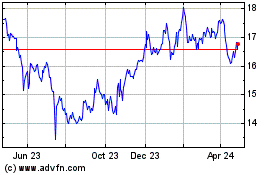By Ryan Knutson and John D. McKinnon
The Trump administration on Thursday is expected to announce a
$6.5 billion deal with AT&T Inc. to build a nationwide wireless
broadband network for first responders, a project that was proposed
after the 9/11 terrorist attacks but has struggled to get off the
ground.
The decision is a major step forward for FirstNet, as the
program is called, though it still faces challenges. Some states
are unsure whether to join FirstNet or build their own networks,
and a politically connected startup that lost out on the contract
is encouraging them to opt-out.
Wilbur Ross, the Commerce Secretary, is expected to announce the
25-year contract to AT&T and its partners, which include
Motorola Solutions Inc., according to people familiar with the
matter. The earliest construction could begin is later this
year.
A nationwide wireless broadband network that police, fire and
other first responders could use exclusively during an emergency
was one of dozens of recommendations made by the 9/11 Commission in
2004 -- it is the only one that hasn't been completed, the Commerce
Department says. During 9/11, communication breakdowns are thought
to have been a major contributor to deaths among first
responders.
Currently, first responders share wireless networks with regular
consumers, meaning communication between police officers regarding
an active shooter, for example, can get clogged by the same network
congestion a smartphone user faces when streaming a YouTube
video.
"It will be a great thing for us," said Neil Miller, the Buffalo
County Sheriff in Kearney, Neb. Mr. Miller's department currently
pays Verizon Communications Inc. for wireless service, which
supports remote command posts, patrol cars and officers' devices.
Like regular customers, Mr. Miller's staff has faced slower
connections when people pour into town for a regional car show.
"Public safety has no priority right now," Mr. Miller said. "We
are just another user. We look the same in the network as everybody
else."
The 2012 congressional legislation that created FirstNet allows
for states to build their own alternative systems. Already, some
states, including Colorado, New Hampshire, Alabama, Arizona and
Michigan have been exploring the possibility of opting out. Because
more populated areas help subsidize more rural ones, some experts
say FirstNet's viability could be endangered if too many states
drop out.
Ryan Burchnell, executive director of the Alabama Law
Enforcement Agency, said Alabama is just doing due diligence. "If
you don't look at the alternatives, I don't know how you make an
informed decision," he said.
An upstart company that lost the competition for the federal
contract has said it will make a concerted effort to win state
contracts to run independent networks. The company, called Rivada
Mercury LLC, has said the network will be "won or lost at the state
level."
The startup is run by former wireless industry executives and
has joined with other vendors such as equipment makers Ericsson AB
and Nokia Corp. It also has deep political ties. Presidential
candidates Jeb Bush and Martin O'Malley are among its board
members.
"Do you want to be line item 1? Or line item 4,363. And that's
where public safety is for the budgets of these carriers," Declan
Ganley, Rivada's chief, said. "This is not a rejection of FirstNet,
it's just a different way of fulfilling the mission."
Rivada sued in November to block the federal government from
awarding the contract to AT&T, but the case was struck down
earlier this month by the U.S. Court of Federal Claims.
The Fraternal Order of Police has criticized the process. The
group worries the procurement process has been opaque and that
AT&T may not be willing to spend to build connections in
extremely rural areas where there's little usage.
"It would be an understatement to say we were disappointed" with
the government's handling of the project, Jim Pasco, a senior
adviser to the Fraternal Order of Police, said in a recent
interview. "AT&T is a reputable company. But they're a
reputable company doing what reputable companies do: They're trying
to make a profit."
AT&T declined to comment on the criticism. "We are waiting
for FirstNet to announce the award, just like everyone else," a
spokesman said. In a December regulatory filing, the company said
it looked "forward to serving the public safety community through
this contract and making a significant investment in the
infrastructure of our country."
FirstNet Chief Executive Michael Poth said the review process
has been rigorous and included endorsements from other public
safety groups. Mr. Poth said he is confident states will choose
FirstNet rather than opt out and build on their own.
There are many challenges in building a nationwide public safety
service. Unlike the existing networks that are built around
population centers, FirstNet is intended to offer more complete
coverage in less populated areas where it doesn't make financial
sense for the carriers to spend.
Cost estimates for the FirstNet project vary widely, from $12
billion to $47 billion over 10 years, according to the Government
Accountability Office. There aren't enough police and fire
departments in the nation to support the cost of construction and
operation.
The current project seeks to develop a self-funding network that
earns revenue from subscription fees from first responders and will
be subsidized by allowing AT&T to resell excess capacity to
commercial customers. The $6.5 billion comes from a 2015 government
airwaves auction, and FirstNet will also give the winner a large
and valuable swath of wireless airwaves.
This is the third attempt at getting a network built. In 2008,
the Federal Communications Commission tried auctioning wireless
airwaves to cellphone carriers with the condition that the winning
carrier had to give first responders priority network access, but
no company bid high enough to win.
Then, the Commerce Department doled out grants for local
governments to build their own networks. By 2012, more than 20
counties, cities and states signed up and more $300 million was
distributed. But officials feared each area would use different
technologies and be unable to integrate into a unified system. The
federal government put those projects on hold.
Drew FitzGerald and Thomas Gryta contributed to this
article.
Write to Ryan Knutson at ryan.knutson@wsj.com and John McKinnon
at john.mckinnon@wsj.com
(END) Dow Jones Newswires
March 30, 2017 05:44 ET (09:44 GMT)
Copyright (c) 2017 Dow Jones & Company, Inc.
AT&T (NYSE:T)
Historical Stock Chart
From Mar 2024 to Apr 2024

AT&T (NYSE:T)
Historical Stock Chart
From Apr 2023 to Apr 2024
